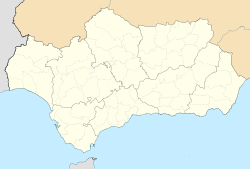|
Alcalá de los Gazules
Alcalá de los Gazules is a city and municipality located in the province of Cádiz, Spain. According to the 2006 census, the town has a population of 5,633 inhabitants. Alcalá de los Gazules is situated in the Sierra de Cádiz. Although not officially one of the pueblos blancos, Alcalá is still listed, since 1984, as having Artistic-Historic status. HistoryAlcalá de los Gazules was first populated by the Romans in CE189 and supplied them with food, oil, wine, and metal. During Roman occupation, the city was known as Lascuta. As the Roman empire weakened, the Vandals moved in and renamed the area Valdalusia but they lasted only twenty years, 409–429. They were followed by the Visigoths who left behind the impressive tower, the Mesa de Esparragal. For many years until the Catholic Ferdinand and Isabella took control, at the end of the 15th century of the last Muslim kingdom in the south of Spain, there was a demarcation line between the Islamic and Christian regions, along which sat towns that are now known as the pueblos blancos, the white towns, and Alcalá was on the border. Many of these towns were fortified and Alcalá has a number of towers around its perimeter, now fallen into disrepair. Following the Catholic consolidation in Spain, many mosques were knocked down and in Alcalá, the famous church of San Jorge in the top square was built in the mid-16th century on top of the ruins of the old mosque. Demographics
Monuments and sights
 Celebrations
Economy
Native peopleGallery
See alsoReferences
External linksWikivoyage has a travel guide for Alcala de los Gazules. Wikimedia Commons has media related to Alcalá de los Gazules.
|
|||||||||||||||||||||||||||||||||||||||||||||||||||||||||||||||||||||||||||||









